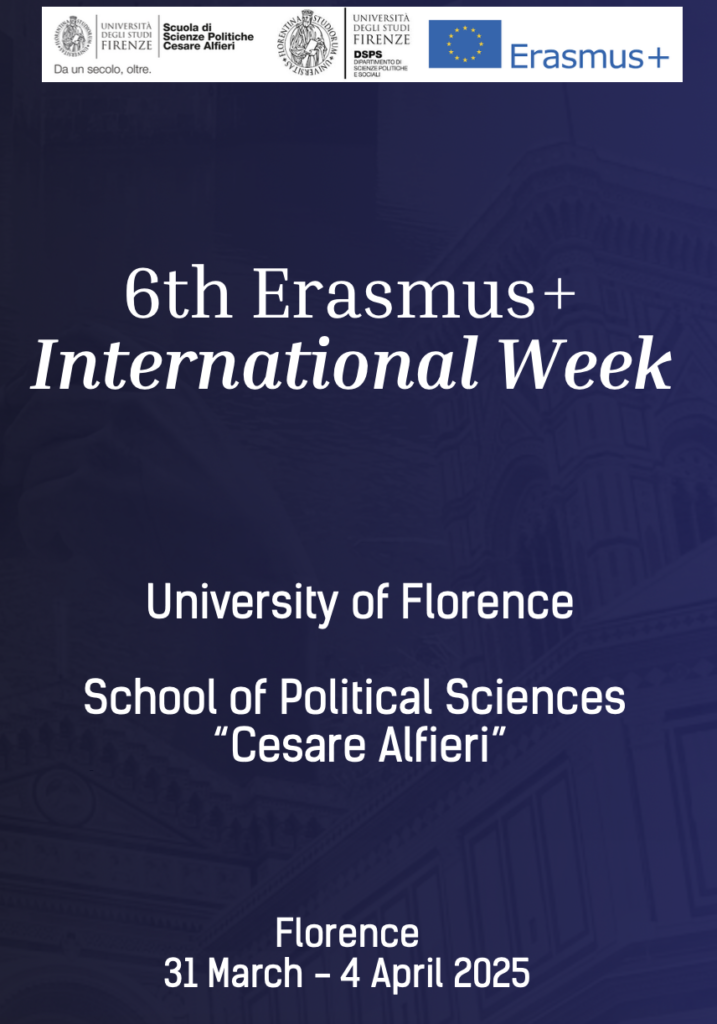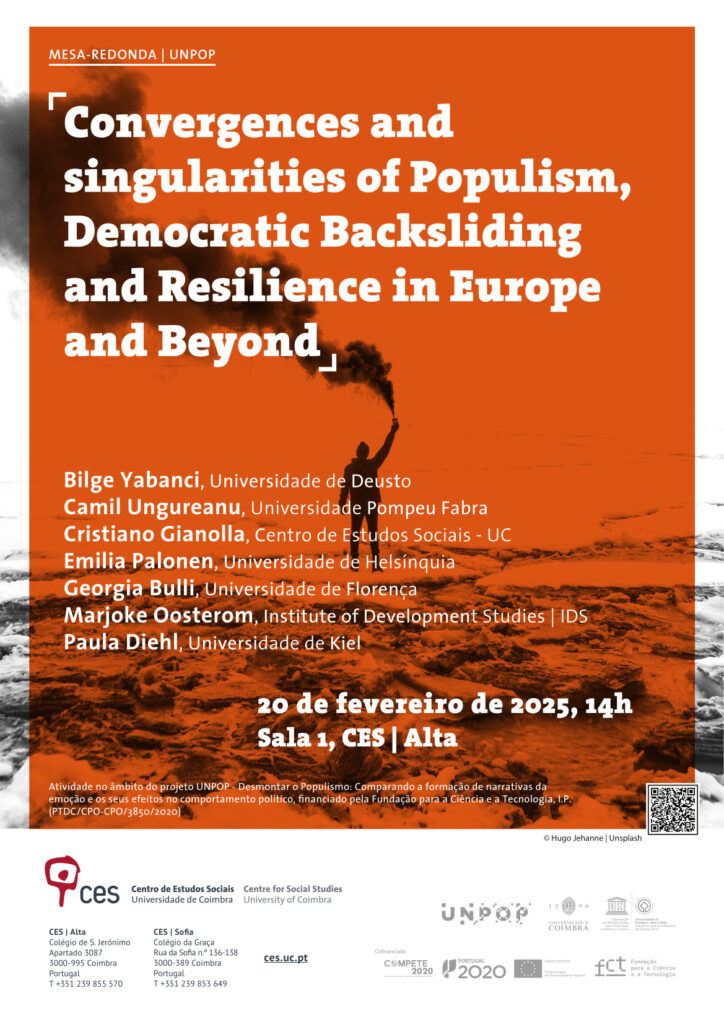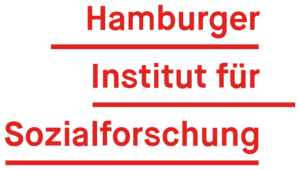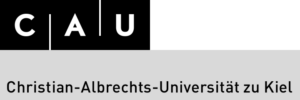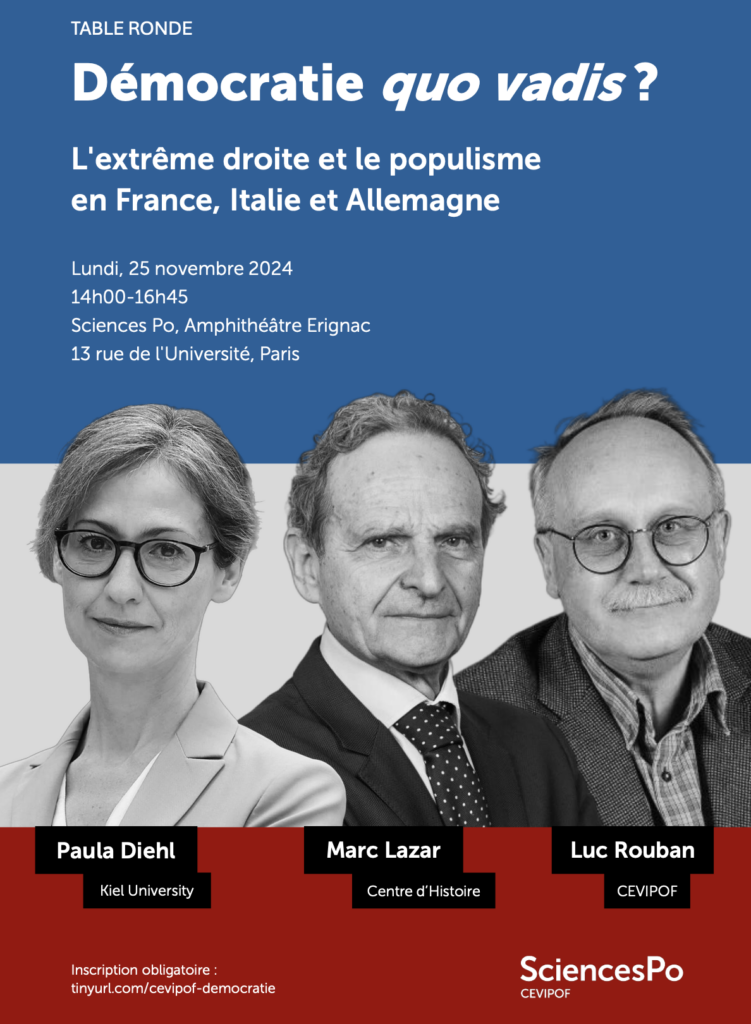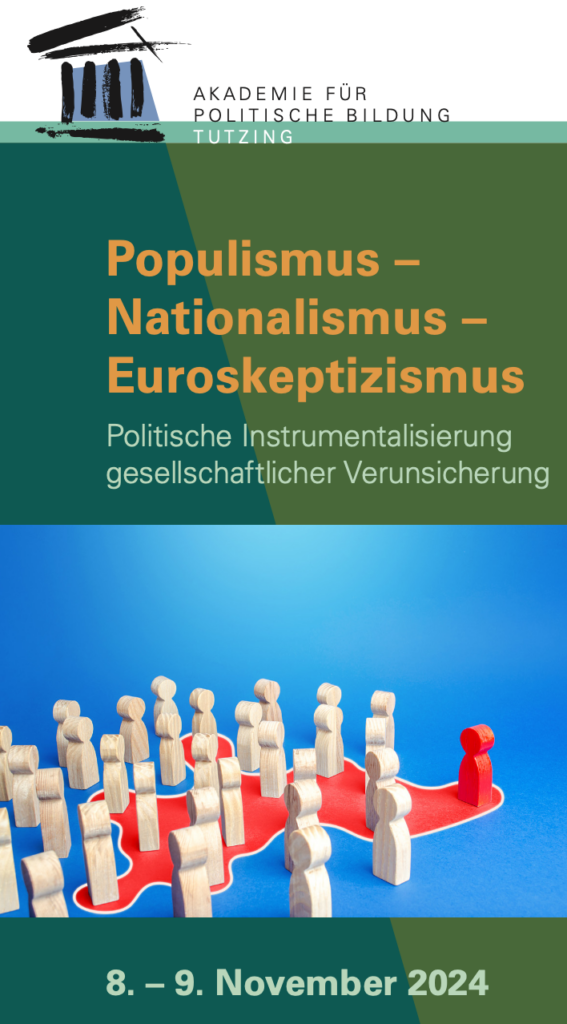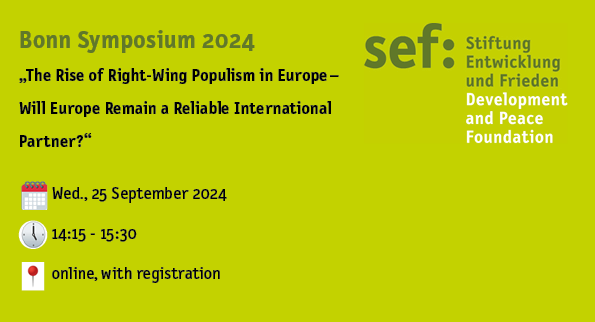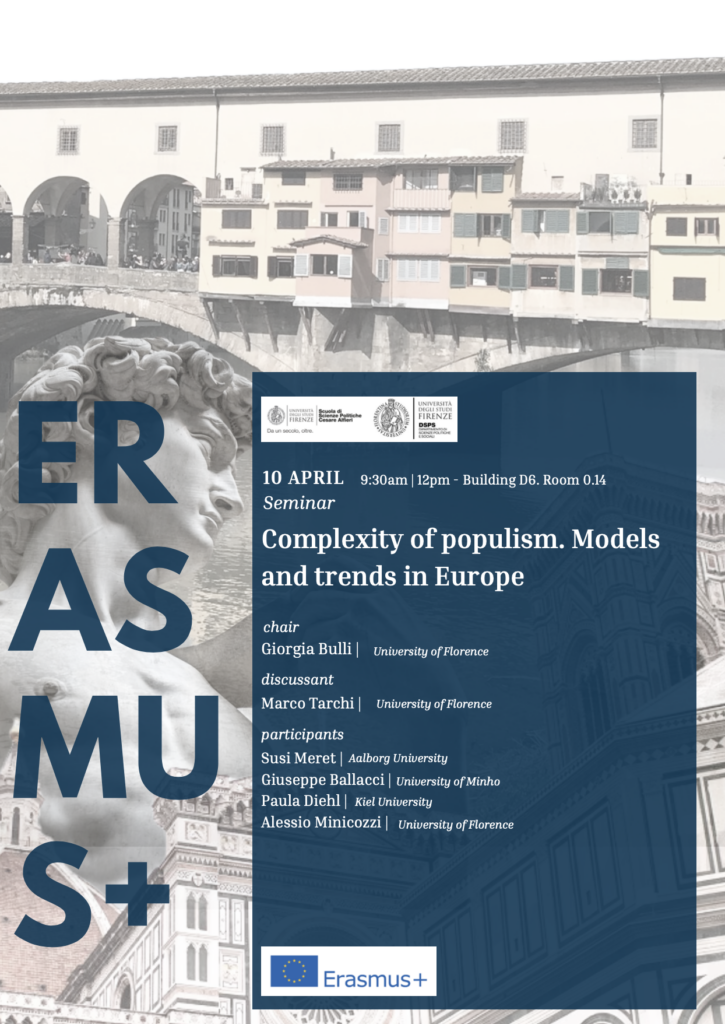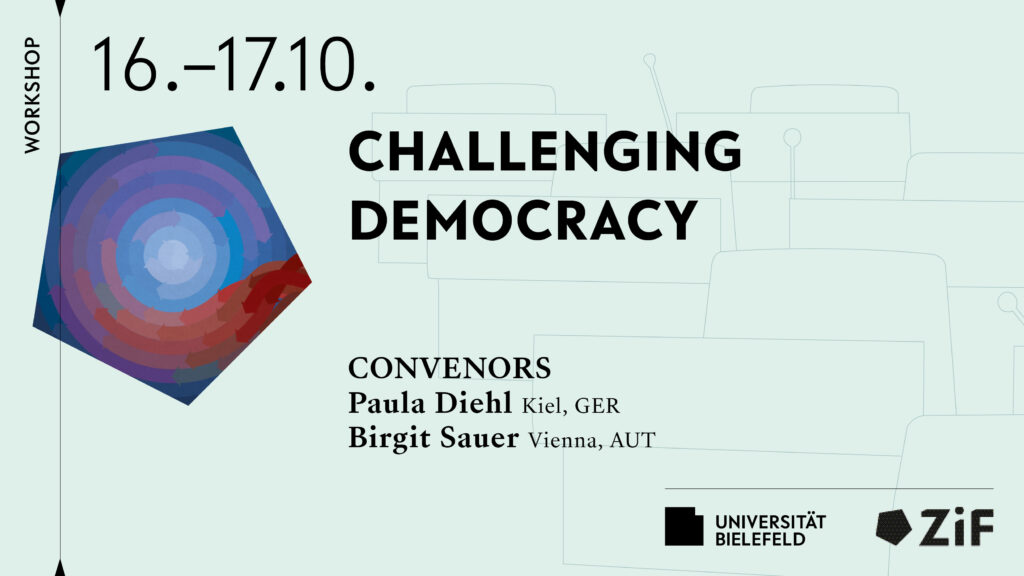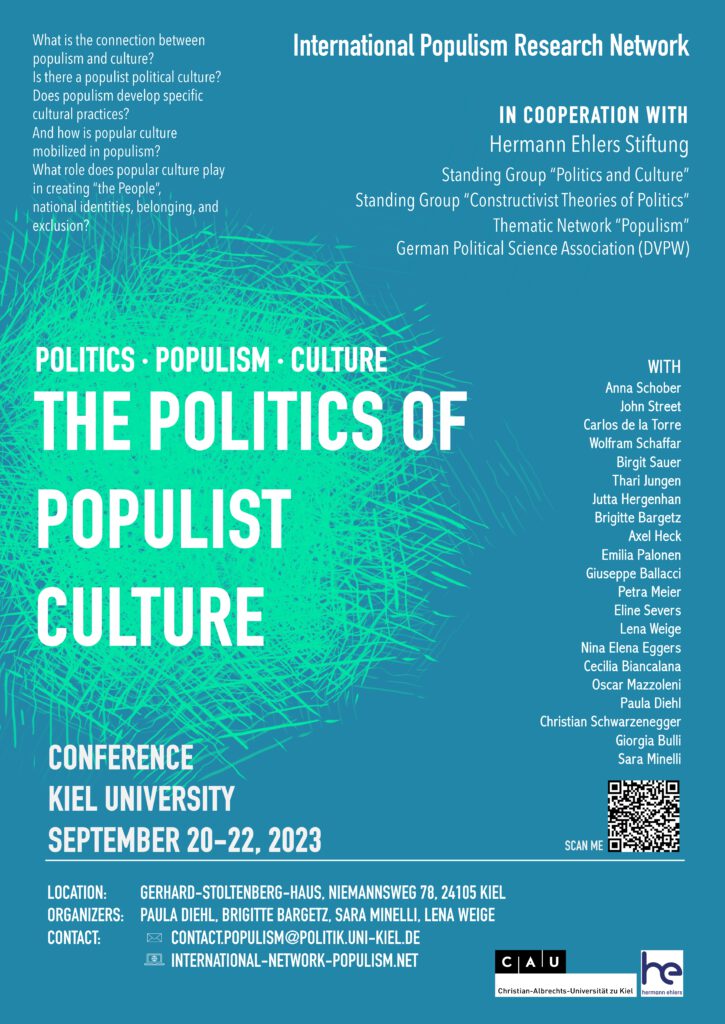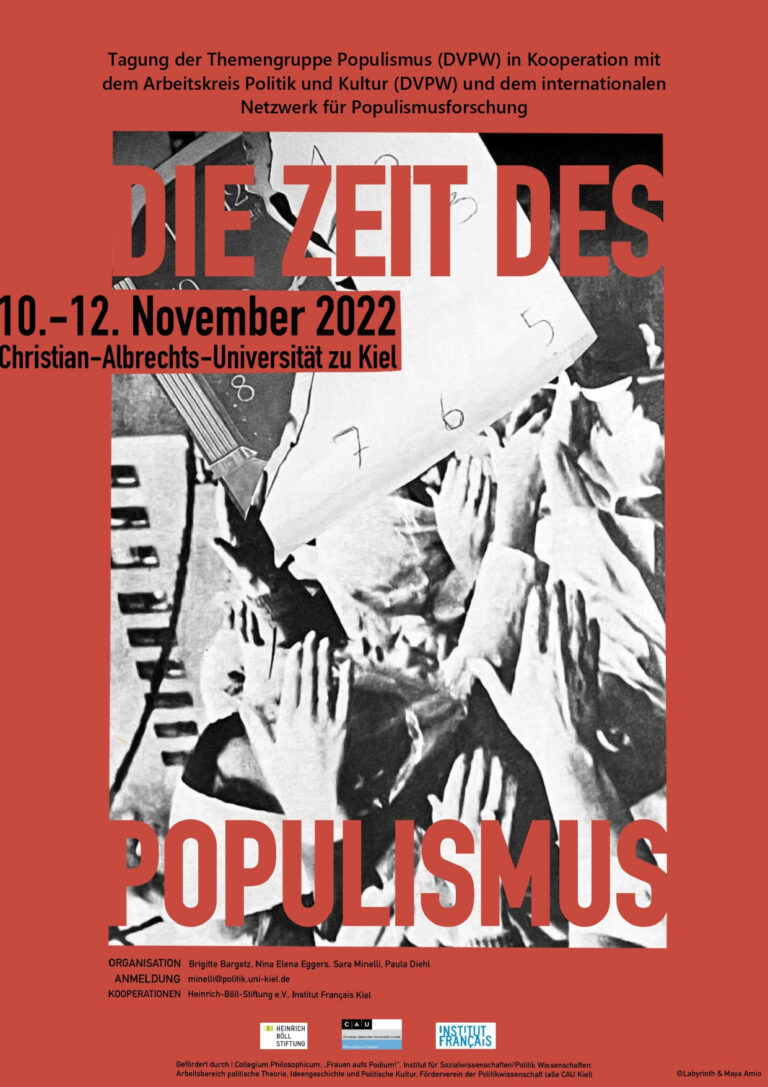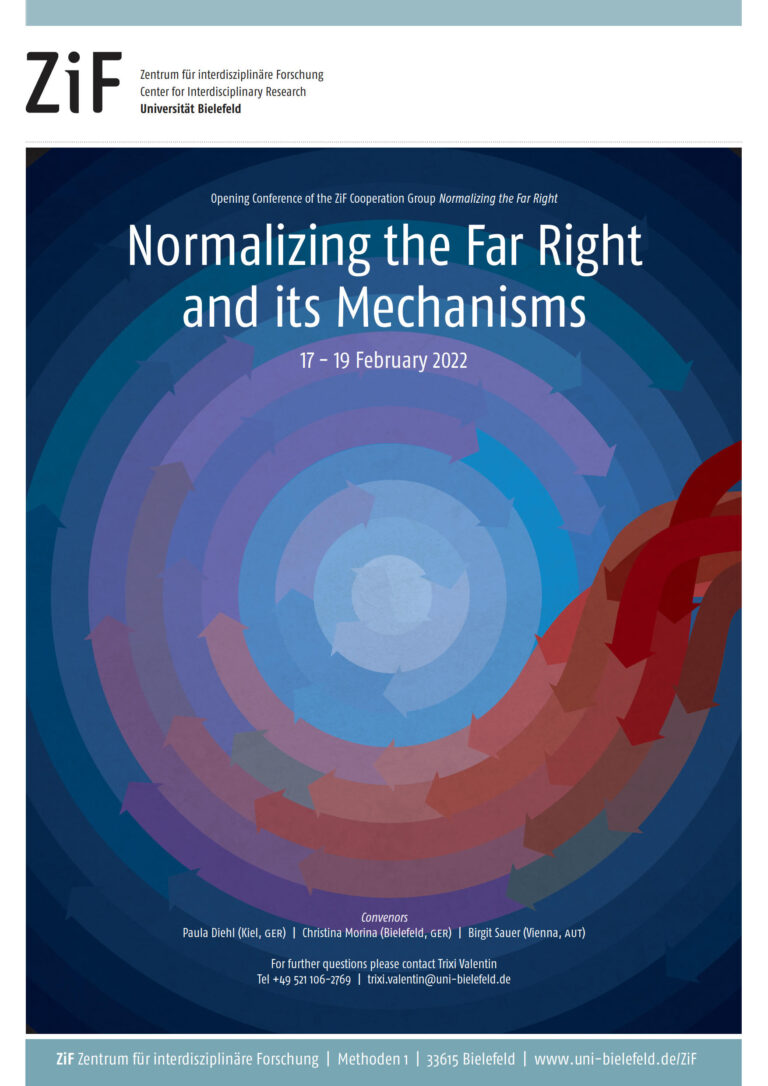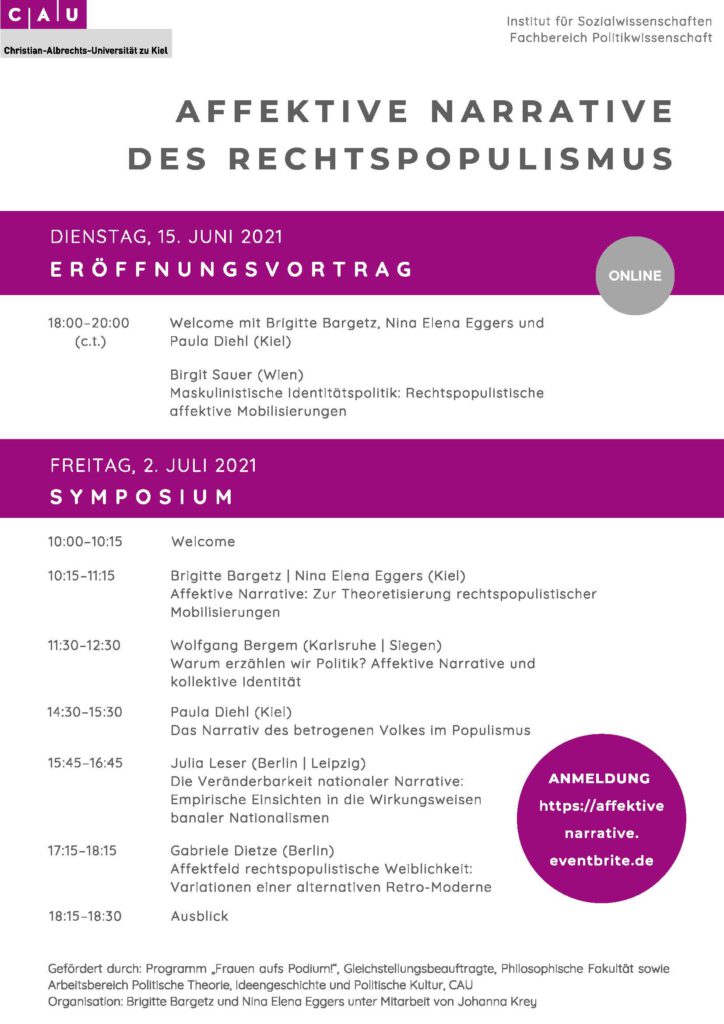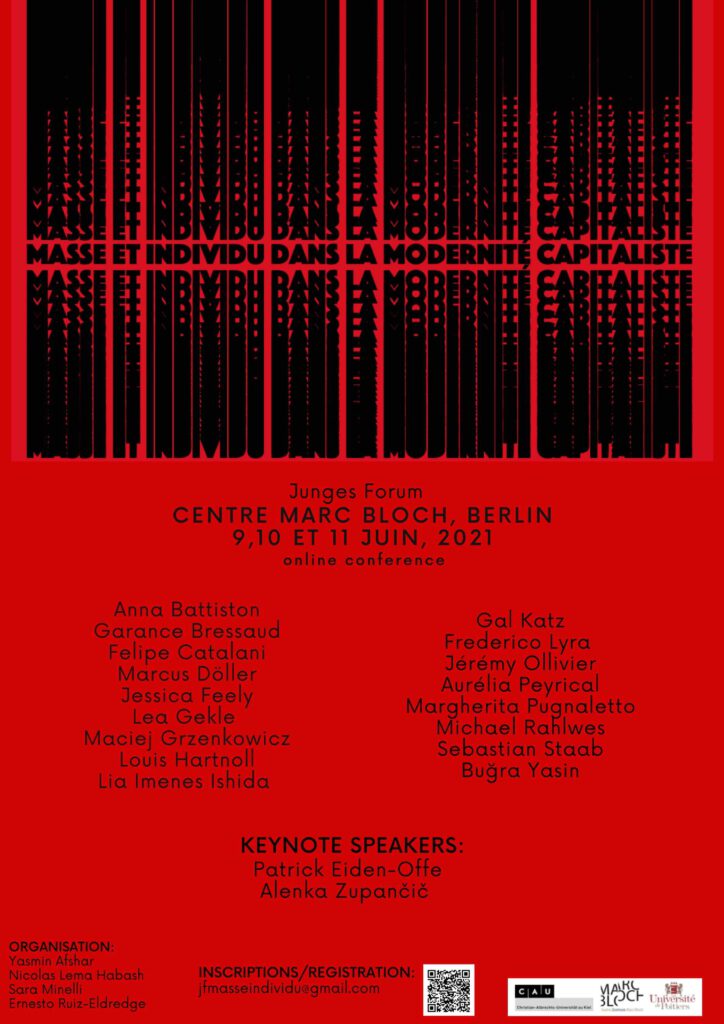Archive
2025
LEIBNIZ RESEARCH ALLIANCE “VALUE OF THE PAST” – ANNUAL CONFERENCE 2025
LEIBNIZ RESEARCH ALLIANCE “VALUE OF THE PAST” – ANNUAL CONFERENCE 2025
Lecture by Paula Diehl
Populist Twists and the Dangers for Democracy
Public Talk at Kiel University (in German)
Where is the journey heading? The AfD between normalization and radicalization
(TU Chemnitz)
6pm – 8pm

Panel discussion with Paula Diehl (in German)
How can young people keep a clear view in the flood of digital information?
Keynote by Paula Diehl
Populism and Politainment
Panel Discussion (in German)
Broken Masks: What Populism tells us about ourselves
- Dr. Bendix Hügelmann (CEO People On The Hill)
- Anina Laura Pommerenke (Reporterin, Moderatorin und Nachrichtensprecherin für den Norddeutschen Rundfunk und ARD-Programme)
- Prof Dr Paula Diehl(Professur für Politische Theorie, Ideengeschichte und Politische Kultur an der CAU Kiel)
Roundtables, Seminars and Classes
6th Erasmus+ International Week
Round Table
Convergences and singularities of Populism, Democratic Backsliding and Resilience in Europe and Beyond
Workshop
Continuity and Innovation of the Far Right: Practices, Symbols and Discourses
- Political Theory, History of Ideas and Political Culture Section at Kiel University
- International Populism Research Network at Kiel University
The process of mainstreaming and normalizing far-right politics has a longer history that goes back at least to the emergence of the new right in the 1960s and 1970s. Over the past years, however, the strategic and discursive repertoire of the far right has undergone significant changes that need to be considered in order to make sense of its current rise to power. This workshop is dedicated to this relationship between continuity and innovation. Bringing together international scholars from a wide range of disciplines, it puts a particular emphasis on historical, transnational and intersectional research perspectives.
2024
Panel Discussion
Democracy quo vadis? The far right and populism in France, Italy and Germany
Conference – Akademie für politische Bildung in Tutzing
Populism – Nationalism – Euroscepticism The political instrumentalisation of societal uncertainty
Date: 8-9 November 2024
Location: Akademie für Politische Bildung, Tutzing am Starnberger See
Cooperation between Hermann-Ehlers-Stiftung and Kiel University
Panel
“The Rise of Right-Wing Populism in Europe – Will Europe Remain a Reliable International Partner?”
At the European elections this year, populist movements have recorded considerable gains in votes in many countries. What does it mean for the future of the EU, if eurosceptics gain more influence in its institutions?
This will be discussed at the online Bonn Symposium 2024:
„The Rise of Right-Wing Populism in Europe – Will Europe Remain a Reliable International Partner?“ on Wednesday, 25 September, 14:15-15:30 hrs.
International Conference
Political Ideologies: Tracing the History of Concepts and Languages in a Global Context
The 25th International Conference of the History of Concepts Group (HCG) takes place in the city of Rio de Janeiro, Brazil, from 7-9 December 2024. It is hosted by the Rui Barbosa Foundation and the Institute of Social and Political Studies at the State University of Rio de Janeiro (IESP-UERJ). The main theme for this year’s conference is ideologies, with a particular emphasis on the historical construction of the concepts structuring political ideologies.
CONFERENCE OF THE GERMAN POLITICAL SCIENCE ASSOCIATION (DVPW)
Nichts steht mehr fest? Plurale Perspektiven auf politische Kontestation
Date: 7 – 8 March 2024
Location: Christian-Albrechts-Universität zu Kiel (Ludwig-Meyn-Straße 8)
Organizers: Laura von Allwörden, Elena Dück, Falk Ostermann
In cooperation with the Thematic Networks ‘Foreign and Security Policy’, ‘Discourse Analysis’ and ‘International Organization’
The diagnosis that we are living in a globalized world of upheaval and a time of multiple crises is omnipresent. This goes hand in hand with the questioning of existing political orders, whether at national or international level. Politicization and contestation have become phenomena that have affected all facets of the actions of states and other international, social and economic actors.
Seminar Series
POPULISM, DEMAGOGUERY AND RHETORIC IN HISTORICAL PERSPECTIVE (PDRHP)
Date:
14 March 2024, 4 pm
Location:
Centre for Ethics, Politics and Society, University of Minho (Portugal), online
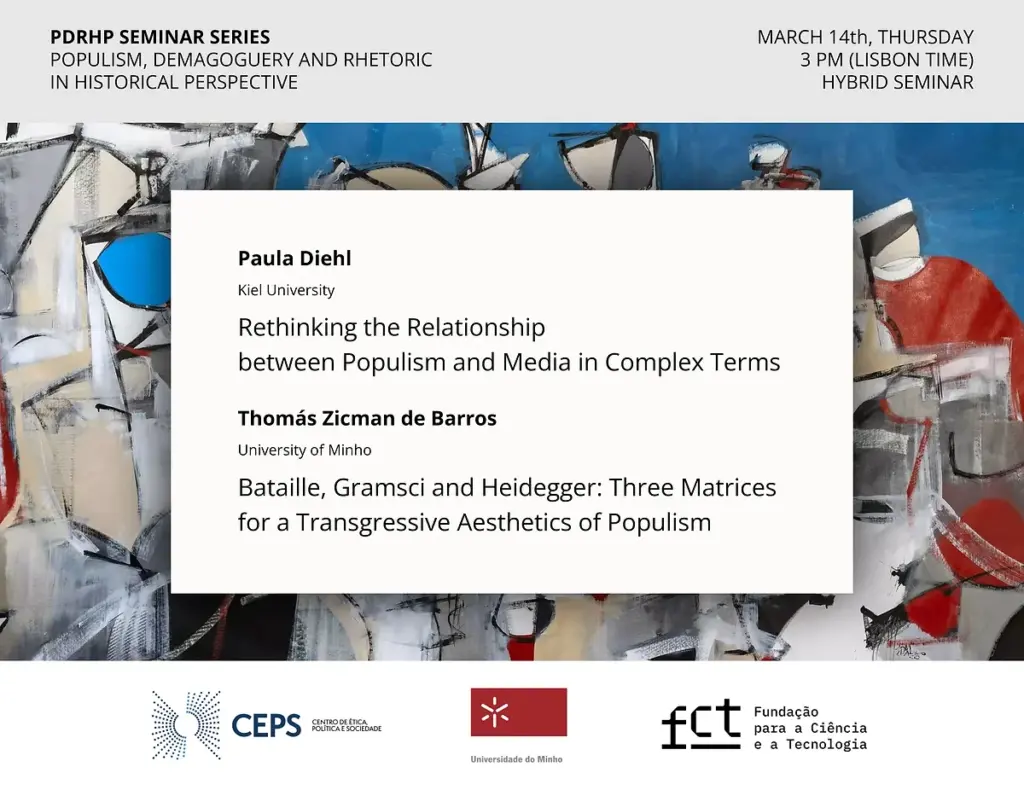
This hybrid session features two presentations. Paula Diehl (Kiel University) will discuss „Rethinking the Relationship between Populism and Media in Complex Terms“, and Thomás Zicman de Barros (CEPS, UMinho) will present „Bataille, Gramsci and Heidegger: Three Matrices for a Transgressive Aesthetics of Populism“.
PDRHP is a research project dedicated to the study of populism, demagoguery, and rhetoric in historical perspective, under the coordination of Giuseppe Ballacci, member of the International Populism Research Network at Kiel University.
For inquiries, contact gballacci@elach.uminho.pt or thomas.zicmandebarros@sciencespo.fr
LIVESTREAM
GIORGIA BULLI: DIE FASCHISTISCHE TRADITION IN ITALIEN
Date: 9 January 2024, 2:45 pm
Location: Kiel University
MA Lecture Series:
On the Topicality of Totalitarianism and Fascism
Prof Dr Paula Diehl
Giorgia Bulli is Senior Lecturer of Political Science at the Università degli Studi di Firenze. She is also member of the International Populism Research Network at Kiel University.
2023
LIVESTREAM
CARLOS DE LA TORRE: FASCISM AND POPULISM
Date: 19 December 2023, 2:45 pm
Location: Kiel University
MA Lecture Series:
Political Theory: On the Topicality of Totalitarianism and Fascism
Prof Dr Paula Diehl
The elections of Donald Trump in 2016 and Jair Bolsonaro in 2019 in Brazil, their belligerent use of the presidency to transform democratic rivals into enemies, their praise for right-wing para-military groups, Bolsonaro’s nostalgia for dictatorship, and Trump’s attempt to stay in power using nondemocratic means have brought back the question of fascism and its relationship with populism. What are the boundaries between fascism and populism? How to classify European right-wing parties like the French National Rally, the Italian League, and others? Are they populist, nativist, and xenophobic, or postfascist? Could right-wing xenophobic populism mute into postfascism?
Challenging Democracy
Date: 16 – 17 October 2023
Location: Long Table, Zentrum für interdisziplinäre Forschung (ZiF), Universität Bielefeld
Convenors: Paula Diehl (Kiel University), Birgit Sauer (University of Vienna), Wilhelm Heitmeyer (Bielefeld University) and Mojca Pajnik (University of Ljubljana)
Conference of the International Network for Populism Research
Politics, Populism, Culture – The Politics of Populist Culture
Date: 20 – 22 September 2023
Location: Gerhard-Stoltenberg-Haus, Niemannsweg 78, 24105 Kiel
Organizers: Paula Diehl, Brigitte Bargetz, Sara Minelli, and Lena Weige
In cooperation with Hermann Ehlers Stiftung, the Standing Groups ‚Politics and Culture‘ and ‚Constructivist Theories of Politics‘, as well as the Working Group ‚Populism‘, German Political Science Association (DVPW)
With Anna Schober (U Klagenfurt), John Street (U East Anglia), Carlos de la Torre (U Florida), Wolfram Schaffar (U Passau), Birgit Sauer (U Vienna), Thari Jungen (Kunsthochschule, Mainz), Jutta Hergenhan (U Gießen), Brigitte Bargetz (U Kiel/WU Vienna), Axel Heck (U Kiel), Emilia Palonen (U Helsinki), Giuseppe Ballacci (U Minho), Petra Meier (U Antwerp), Eline Severs (U Brussel), Lena Weige (U Kiel), Nina Elena Eggers (U Hamburg/Bremen), Paula Diehl (U Kiel), Christian Schwarzenegger (U Bremen), Giorgia Bulli (U Florence), and Sara Minelli (U Kiel).
2022
Conference of the Populism Working Group (DVPW) in collaboration with the Politics and Culture Standing Group (DVPW)
Zeit des Populismus
Date: 10 - 12 November 2022
Location : Olshausenstraße 40 („Alte Mensa“)
Organizers: Brigitte Bargetz, Nina Elena Eggers, Sara Minelli, Paula Diehl
The conference "Die Zeit des Populismus" (In Times of Populism) took place at CAU Kiel from 10.11. to 12.11.2022 in cooperation with Heinrich Böll Foundation e.V. and the Institut Français Kiel.
The presentations explored the phenomenon of time and temporality in populism from a number of empirical and theoretical angles. They not only asked what it means to live in a ‘time of populism’, but also discussed how the various populist movements and parties make use of temporality, which narratives they rely on, and what alternative politics of time might look like. The presentations provided fascinating insights into the complex relationship between populism, time and temporality.
Panel discussion on "In Times of Right-Wing Populism" as part of the conference with Ole Meinefeld, Johannes Kiess, Lea Liese and Carolin Wiedemann
Normalizing the Far Right and its Mechanisms
Date: 17 – 19 Februar 2022
Location: ZiF Bielefeld
Organizers: Paula Diehl (KIEL, GER), Christina Morina (BIELEFELD, GER), Birgit Sauer (VIENNA, AUS)
Members Core Group
Paula Diehl (Kiel, GER), Wilhelm Heitmeyer (Bielefeld, GER), Christina Morina (Bielefeld, GER), Mojca Pajnik (Ljubljana, SLO), Birgit Sauer (Vienna, AUS)
Speakers
Brigitte Bargetz (Kiel, GER), Mabel Berezin (Cornell, USA), Oliver Decker (Leipzig, GER), Gabriele Dietze (Humboldt, GER), Nina Eggers (Kiel, GER), Thomas Ernst (Antwerp, BEL), Ute Frevert (Berlin, GER), Virág Molnár (New York, USA), Julia Roth (Bielefeld, GER), Daniel Thiele (Vienna, AUT), Volker Weiß (Hamburg, GER), Ruth Wodak (Lancester, USA)
2021
DVPW–Congress 2021
Panel: From Neoliberalism to Authoritarian Populism. Gender Policy Challenges
Location: online
Organizers: Brigitte Bargetz (CAU Kiel), Nina Elena Eggers (CAU Kiel), Karsten Schubert (ZiF Bielefeld/ALU Freiburg)
Date: 14 September 2021
Supporting subdivisions: Section „Politische Theorie und Ideengeschichte“, section „Politik und Geschlecht“, working group „Politik und Kultur“, topic group „Populismus“
The panel explores the relationship between neoliberalism, authoritarian populism, and "anti-genderism" from the perspectives of capitalism and right-wing populism critique, feminist, and queer. Where and how does the governance of sexual freedom and sexual security intertwine in relation to authoritarianism and neoliberalism? How do right-wing populist LGBTI*Q hostility and pushes for the retraditionalization of families and carework contribute to the development of neoliberal authoritarianism? And what analyses and recommendations for action does queer and feminist theory contribute to the democratization of democracy in authoritarian times?
Speakers: Gundula Ludwig (University Innsbruck), Paula Diehl (CAU Kiel) and Mike Laufenberg (UniversityJena)
Kiel University
Workshop: The Complexity of Populism
Date: 19. – 21. July 2021
Location : online
Organizers: Brigitte Bargetz and Paula Diehl
Kiel University
Affective Narratives of Right-Wing Populism
Datum: 15. Juni und 2. Juli 2021
Ort: online
Organisation: Brigitte Bargetz und Nina Elena Eggers
Storytelling is a crucial aspect of politics. Narratives recall memories, organize political experiences, and (re-)imagine and legitimize social relations. Yet, storytelling is also affective. It helps sorting one’s feelings, it makes emotional reactions recognizable, and evokes political affects. Similarly, the past and the future are affectively inscribed in political narratives. The interplay of the political, affective, and narrative is also evident in the current rise of right-wing populism: for example, when Björn Höcke affects crowds with a narrative of reawakening masculinity or when Donald Trump tells a story of the former American president and slaveholder Andrew Jackson as a generous peacemaker who became angry in the face of civil war. In our symposium we will examine these connections together with inter/national experts on affect, narratives, right-wing populism, gender relations, racism and nationalism.
Centre Marc Bloch, BERLIN
Masse und Individuum in der kapitalistischen Moderne
Date: 9. – 11. Juni 2021
Location : online
Organizers: Yasmin Afshar (Humboldt-Universität zu Berlin/Centre Marc Bloch), Nicolas Lema (Université Paris 1 Panthéon-Sorbonne), Sara Minelli (CAU Kiel/Centre Marc Bloch), Ernesto Ruiz-Eldredge (Goethe-Universität Frankfurt/Université de Poitiers)
The notion of the “mass” is back on the agenda. Recent large-scale popular protests, the extraordinary importance acquired by social networks, the current appeal of conspiracy theories, as well as so-called “populist” phenomena, have triggered a renewed discussion around this concept. Since its emergence at the beginning of capitalist modernity, the idea of the 'mass' has implied a certain reactionary conception of collective action, according to which the individual's judgment capacity is eclipsed by irrational behavior. The First World War and the rise of fascism apparently brought to reality this representation: the individual, weakened by social atomization, succumbed to a tyrannized mass. In contrast, during the last two hundred years, the participation of the individual in collective bodies—be it the “mass,” “multitude” or “people”—has inspired revolutionary hopes for emancipation. It is therefore relevant to ask: is it possible to speak of the "mass" without falling into either an unqualified condemnation of collective action or a pure exaltation of the multitude? From factory workers to "petty bourgeois” masses, do we find specific organizational regimes in the constitution of their political subjectivity? What are the material and intellectual means whereby artworks represent and transform the links between the mass and the individual? Have the social sciences successfully theorized the mass? Is the moral and psychic autonomy of individuals affected by the capitalist organization of society? What can be said about the recurrent phenomenon of the mass adhering to conspiracy theories? In this sense, are the masses simply prey of ideological domination? Or, on the contrary, do they exhibit a will-to-know, unnoticed by the “elites”?
2020
Kiel University
Workshop: Theory and Methods of Populism Research
Date: 24. – 26. September 2020
Location: online
Organizers: Brigitte Bargetz and Paula Diehl
Legal Notice:
Institute of Social Sciences/Political Science
Olshausenstr. 40
24118 Kiel
Represented by: Prof. Dr. Paula Diehl (Director)
Olshausenstr. 40
24118 Kiel
phone: +49 431 880-5217
mail: contact.populism@politik.uni-kiel.de
Liability for links: Our offer contains links to external websites of third parties, on whose content we have no influence. Therefore, we cannot accept any liability for any external content. The respective provider or operator of the site is always responsible for the content of the linked sites. The linked pages were checked for possible legal violations at the time of linking. Illegal content was not identified at the time of linking.However, a permanent control of the content of the linked pages is not reasonable without concrete evidence of a violation of the law. If we become aware of any infringements, we will remove such links immediately.
Copyright: The content and works on these pages created by the site operators are subject to German copyright law. The reproduction, editing, distribution and any kind of use outside the limits of copyright law require the written consent of the respective author or creator. Downloads and copies of these pages are only permitted for private, non-commercial use.
Insofar as the content on this site was not created by the operator, the copyrights of third parties are observed. In particular, third-party content is identified as such. Should you nevertheless become aware of a copyright infringement, please inform us accordingly. If we become aware of any infringements, we will remove such content immediately.
Webdesign by: Lilit K
Contact via mail

